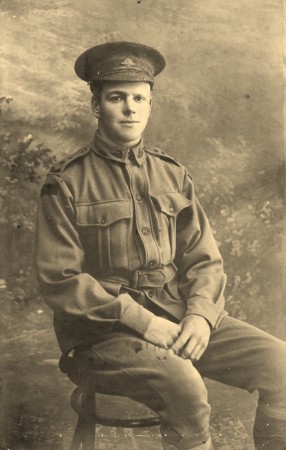WWI Stories – John Earnest Floyd
Stawell
Robyn McQualter shares the story of her grandfather, John Ernest Floyd.
John Ernest Floyd enlisted in “C” Coy 5th Battalion at Albert Park on 17 August 1914, aged 20 years. He embarked from Australia on 21 October 1914 aboard the HMAT Orvieto.
 John was in the landing at Anzac Cove Gallipoli with the 5th Battalion on 25 April 1915. The next day he suffered a gunshot wound to the leg, which required his hospitalisation at Heliopolis.
John was in the landing at Anzac Cove Gallipoli with the 5th Battalion on 25 April 1915. The next day he suffered a gunshot wound to the leg, which required his hospitalisation at Heliopolis.
He re-joined his battalion at Anzac Cove in June 1915. In August 1915, he suffered shell concussion which led to his hospitalisation in London.
In January 1917 he was transferred to the Anzac Provost Corps, and subsequently spent the rest of the war in London, where he met Edith Dorothy Searle who was to become his wife and follow him to Australia. They married in London on 21 October 1918.
Edith Dorothy never saw her immediate family in London again. John returned to work in Stawell for the Victorian Railways and would later transfer to Warrnambool as a fireman. John and Dorothy (as she was known) had two children, James John and Hazel Dorothea, both born in Stawell.
Unfortunately, John suffered from deteriorating health as a result of his wartime experiences and passed away on 24 September 1940, aged 40 years. He is buried in Warrnambool Cemetery.
I am the granddaughter of John Ernest Floyd. My mother was John’s daughter Hazel Dorothea. I never knew my grandfather – he died in 1940 before I was born in 1946.
My thoughts and memories of him come from my mother and grandmother. They were immensely proud of him and the fact that he was among the first 500 men to enlist in August 1914. Anzac Day was always a very sad day for my mother, although my grandmother and uncle did march in the Anzac parade in Warrnambool.
Many photographs and mementoes of John’s war service have been passed down to me, including his dog-tag and army pay book. I also have a postcard from Christmas in 1914 printed at sea on the Orvieto.
The Anzac Centenary is very important to me, and I wish to participate in some way to mark the centenary of the landing at Gallipoli. I did consider applying for the ballot for the service at Gallipoli in 2015, but was deterred from doing so by the Department of Veterans’ Affairs website in describing the possible conditions at Anzac Cove. I visited Gallipoli in 1998 and found it immensely moving to be in the place where my grandfather had stood some 80 years before.





